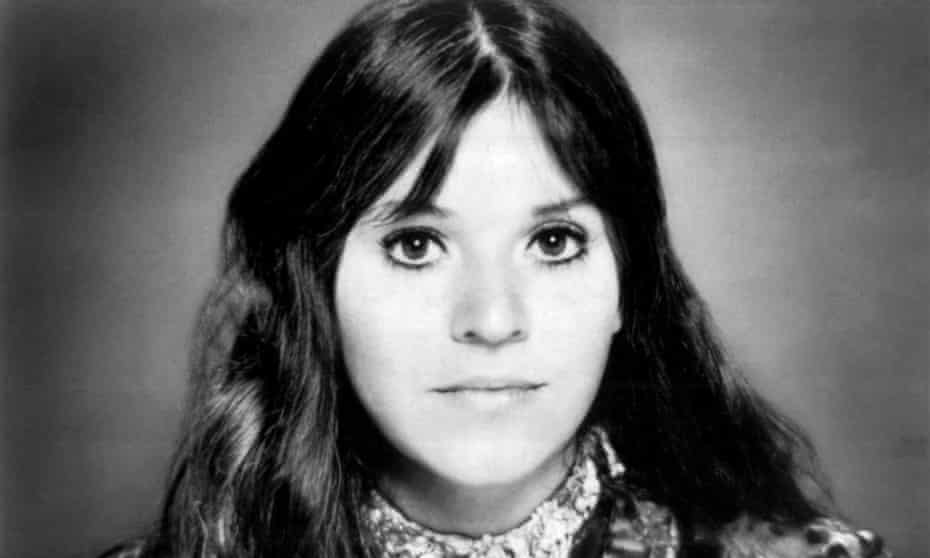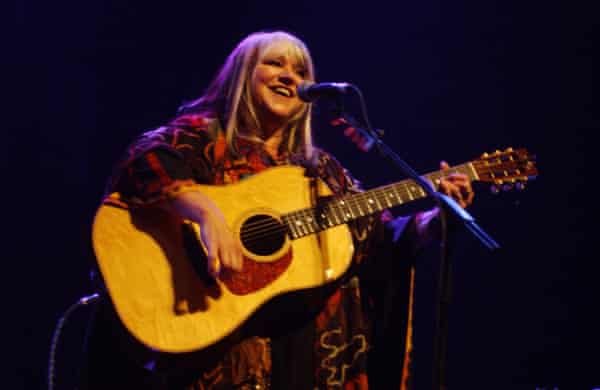Extract from The Guardian
Overlooked and underestimated, Melanie was framed as a winsome folkie and left out of the pantheon of greats. Fifty years on from classic album Gather Me, she wants to be understood.

‘I never felt like I was a hippie ‘ … Melanie in 1975.
Melanie remembers the day she busked in London well. The year was 1983 and the concert she was to play had been cancelled due to unsatisfactory ticket sales. So she was sitting with friends, drinking Pimm’s, when someone called to tell her that fans had congregated outside the Royal Albert Hall. “I thought, I’m just going to grab my guitar and go over there and sing,” she tells me by phone from her home in Tennessee. And so she did. The police arrived to move her on – and shortly thereafter, the headlines spun.
I thought, I can’t do this. I don’t have any hits, nobody knows who I am. I even brought my mom!
“It wasn’t a press stunt, I was just doing what instinctively occurred to me,” says the 74-year-old once lazily hailed as the female Bob Dylan. It’s a philosophy that helped her defy her critics, as she tried to ignore the labels the business applied to her: winsome folk singer, flower child with an edge. “I had a guitar, I had long hair, so I must be a folk singer,” she jokes. Instead, her music is a beguiling mix of earthy folk, mournful blues and rhapsodic pop belted out with a soulful voice; equal parts naive and knowing, she sings with a gravelly rasp that seems to lasso your body.
This year marks the 50th anniversary of her kaleidoscopic classic 1971 album Gather Me. Born Melanie Safka, she was raised in Queens, New York, and her vagabond journey as a musician began in Greenwich Village in the late 1960s. Only a few years later, she was helicoptered on to the stage at Woodstock festival where she was, in her own words, “an industry buzz” without a clue. “It was an unbelievably frightening day,” she says. “I just thought it was a weekend of singing. I pictured families with picnic blankets, and arts and crafts. I had no idea! I walked into the lobby and there was Janis Joplin.” Aged 22, Melanie had never seen a famous person before. “I thought, ‘I can’t do this. I don’t have any hit records, nobody knows who I am.’ I had no musicians with me, no roadie – I even brought my mom!”
There is an endearing innocence to Melanie, even now, alongside a mellow acceptance of the many twists and turns in her career. But there is also an astute perception that, despite her complexities, she was often misunderstood as an artist, regularly made to feel like “a piece of Woodstock fluff” in the press. It’s not clear how much she has let this go.
Take her most recognisable song, Brand New Key – on first listen it sounds like a naive ditty about brand new roller skates, but its twinkling demeanour belies a song about a determined loss of innocence. It rocketed to No 1 in the US singles chart in December 1971, before becoming a novelty hit in the UK when the Wurzels’ The Combine Harvester parodied it in 1976, and has come to define Gather Me in ways that Melanie hasn’t always enjoyed. “It was the bane of my existence for a few years,” she admits. More in keeping with Gather Me as a whole, Brand New Key was originally composed as a blues song, she says – it was subsequently sped up in the studio to attract a broader audience.
“There was a big gap between my reality and the reality of how I was being perceived,” she says when I ask about that song’s narrative. “I was an introvert and all of a sudden I’m a celebrity. I knew that I wasn’t being presented in the way that I am.” Her non-conformity hasn’t always made things easy for her, in an industry where “a girl was just a ‘chick singer’, you know?” She mentions a notable fan, Nirvana’s bass player Krist Novoselic, and a comment he once made that she’d been airbrushed out of history.
In 2007, Jarvis Cocker – another notable fan – introduced her on to the stage at London’s Queen Elizabeth Hall, her first British gig in 30 years. In the reviews, journalists enthusiastically hoisted her into the pantheon of female singer-songwriters regardless of genre – Joni Mitchell, Joan Baez, Janis Joplin – as if she had not occupied that upper stratum previously. It was surely frustrating. Has she ever wondered why?

Refusal to conform … Melanie performing at London’s Queen Elizabeth Hall in 2007. Photograph: Brigitte Engl/Redferns
“I could speculate,” she replies. “It wasn’t the age of smiling women. It had to be much more broody and I was way too cherubic. Men can be cute. Randy Newman can sing Short People and that’s OK because he’s a guy, he’s got something to say. But a girl? How could she possibly have any social significance?”
I ask Melanie what she hoped to achieve as a 24-year-old songwriter recording Gather Me in New York’s Allegro Sound Studio. “I have this desire to be understood,” she says. Thinking back to those early days, she muses: “I kind of wished I didn’t have a body.” Her uncompromising appetite for independence got in the way, too. When she left Buddha Records and set up her own label, Neighborhood Records, in 1971, “it was like a slap in the face to the industry” – which came as a surprise to her at the time, but as she later says, “there was a whole slew of conditions [on] being a woman”. She flouted them anyway, and has since released more than 30 albums, most recently Ever Since You Never Heard of Me in 2010.
As for that flower child label? “I never even felt like I was a hippie, I didn’t like the term. If anything, I was the beat generation – people in the Village expressing themselves in so many ways, not being pigeonholed.” It’s kind of a relief when you’re no longer “the girl”, Melanie says. She’s even thinking about re-recording Brand New Key as the blues single she always envisioned it to be. “I really want to communicate that I’m still here and I’m still doing it. It is 50 years later and I’m not quite decrepit. I think it was [baseball player] Satchel Paige who said, ‘How old would you be if you didn’t know how old you are?’”
That desire to be understood is as strong as ever – and her self-confidence is similarly undimmed. “It’s pretty incredible all these years later that Gather Me could even be relevant; it’s amazing to think that I have soundtracked people’s lives. It really hits the mark.”
No comments:
Post a Comment